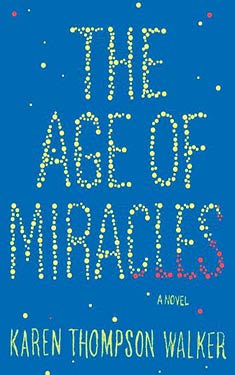The Age of Miracles
| Author: | Karen Thompson Walker |
| Publisher: |
Random House, 2012 |
| Series: | |
|
This book does not appear to be part of a series. If this is incorrect, and you know the name of the series to which it belongs, please let us know. |
|
| Book Type: | Novel |
| Genre: | Science-Fiction |
| Sub-Genre Tags: | Near-Future |
| Awards: | |
| Lists: | |
| Links: |
|
| Avg Member Rating: |
|
|
|
|
Synopsis
"It still amazes me how little we really knew.... Maybe everything that happened to me and my family had nothing at all to do with the slowing. It's possible, I guess. But I doubt it. I doubt it very much."
On a seemingly ordinary Saturday in a California suburb, Julia and her family awake to discover, along with the rest of the world, that the rotation of the earth has suddenly begun to slow. The days and nights grow longer and longer, gravity is affected, the environment is thrown into disarray. Yet as she struggles to navigate an ever-shifting landscape, Julia is also coping with the normal disasters of everyday life — the fissures in her parents' marriage, the loss of old friends, the hopeful anguish of first love, the bizarre behavior of her grandfather who, convinced of a government conspiracy, spends his days obsessively cataloging his possessions. As Julia adjusts to the new normal, the slowing inexorably continues.
Excerpt
We didn't notice right away. We couldn't feel it.
We did not sense at first the extra time, bulging from the smooth edge of each day like a tumor blooming beneath skin. We were distracted back then by weather and war. We had no interest in the turning of the earth. Bombs continued to explode on the streets of distant countries. Hurricanes came and went. Summer ended. A new school year began. The clocks ticked as usual. Seconds beaded into minutes. Minutes grew into hours. And there was nothing to suggest that those hours, too, weren't still pooling into days, each the same fixed length known to every human being.
But there were those who would later claim to have recognized the disaster before the rest of us did. These were the night workers, the graveyard shifters, the stockers of shelves, and the loaders of ships, the drivers of big- rig trucks, or else they were the bearers of different burdens: the sleepless and the troubled and the sick.
These people were accustomed to waiting out the night. Through bloodshot eyes, a few did detect a certain persistence of darkness on the mornings leading up to the news, but each mistook it for the private misperception of a lonely, rattled mind.
On the sixth of October, the experts went public. This, of course, is the day we all remember. There'd been a change, they said, a slowing, and that's what we called it from then on: the slowing.
"We have no way of knowing if this trend will continue," said a shy bearded scientist at a hastily arranged press conference, now infamous. He cleared his throat and swallowed. Cameras flashed in his eyes. Then came the moment, replayed so often afterward that the particular cadences of that scientist's speech—the dips and the pauses and that slight midwestern slant—would be forever married to the news itself. He went on: "But we suspect that it will continue."
Our days had grown by fifty-six minutes in the night. At the beginning, people stood on street corners and shouted about the end of the world. Counselors came to talk to us at school. I remember watching Mr. Valencia next door fill up his garage with stacks of canned food and bottled water, as if preparing, it now seems to me, for a disaster much more minor.
The grocery stores were soon empty, the shelves sucked clean like chicken bones.
The freeways clogged immediately. People heard the news, and they wanted to move. Families piled into minivans and crossed state lines. They scurried in every direction like small animals caught suddenly under a light.
But, of course, there was nowhere on earth to go.
Copyright © 2012 by Karen Thompson Walker
Reviews
Images
No alternate cover images currently exist for this novel.



















 Full Details
Full Details






